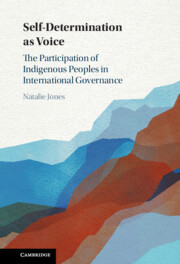Book contents
- Self-Determination as Voice
- Self-Determination as Voice
- Copyright page
- Dedication
- Contents
- Acknowledgements
- Table of Cases
- Table of Treaties
- Abbreviations
- Introduction
- 1 Participation in International Governance and the Logic of Self-Determination
- 2 Finding Support for Indigenous Peoples’ Participation in the Sources of International Law
- 3 The Proliferation of Indigenous Peoples’ Participation, 1982–2007
- 4 Emerging Legal Status? Participation of Indigenous Peoples, 2007–2022
- 5 Conclusion
- Bibliography
- Index
3 - The Proliferation of Indigenous Peoples’ Participation, 1982–2007
Published online by Cambridge University Press: 04 January 2024
- Self-Determination as Voice
- Self-Determination as Voice
- Copyright page
- Dedication
- Contents
- Acknowledgements
- Table of Cases
- Table of Treaties
- Abbreviations
- Introduction
- 1 Participation in International Governance and the Logic of Self-Determination
- 2 Finding Support for Indigenous Peoples’ Participation in the Sources of International Law
- 3 The Proliferation of Indigenous Peoples’ Participation, 1982–2007
- 4 Emerging Legal Status? Participation of Indigenous Peoples, 2007–2022
- 5 Conclusion
- Bibliography
- Index
Summary
In Chapter 3, ‘The Proliferation of Indigenous Peoples’ Participation, 1982–2007’, I trace how a pattern of state practice unfurled over a span of 25 years, beginning with the establishment of the Working Group on Indigenous Populations (WGIP) and spreading to numerous other UN organs, international organizations, and other international governance mechanisms. It at first takes a chronological approach, tracing relevant practice from 1988 to 1994 in processes such as the negotiations towards the International Labour Organization Convention No. 169 on Indigenous and Tribal Peoples, UN conferences, and several UN expert workshops. It then considers how momentum grew towards the establishment of the UN Permanent Forum on Indigenous Issues. The chapter next turns to consider several parallel trends. It turns to mechanisms for Indigenous peoples’ participation in environment and development negotiations, before tracing Indigenous peoples’ participation in decision-making in international development institutions. The chapter ends by examining three regional stories: the Arctic, Latin America and the Caribbean, and the European Union.
Keywords
- Type
- Chapter
- Information
- Self-Determination as VoiceThe Participation of Indigenous Peoples in International Governance, pp. 81 - 153Publisher: Cambridge University PressPrint publication year: 2024

